Prayers before the Blessed Sacrament deepen our connection with the Eucharist‚ blending personal reflection and communal worship. These devotions foster intimacy with Christ‚ offering spiritual renewal and grace‚ with resources like PDF prayer books available for guidance.
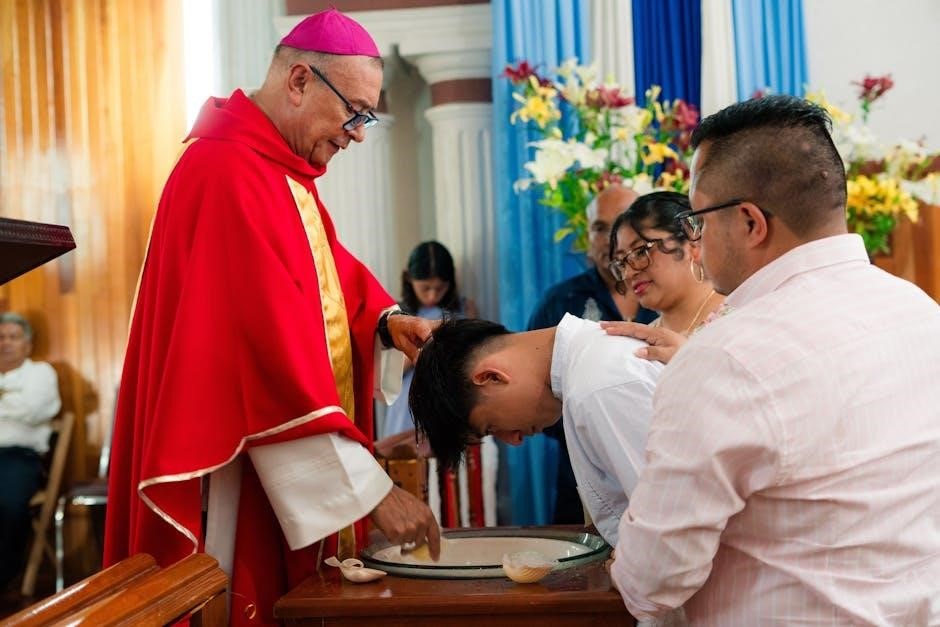
Overview of Eucharistic Devotion
Eucharistic devotion encompasses spiritual practices that honor the presence of Christ in the Blessed Sacrament‚ both during the Mass and in personal or communal adoration. Central to Catholic spirituality‚ these devotions include prayers‚ silent reflection‚ and liturgical ceremonies such as Benediction. The focus is on deepening one’s connection to Christ‚ expressing gratitude‚ and seeking spiritual renewal. Eucharistic devotion also emphasizes the importance of reconciliation and the strengthening of faith. Through these practices‚ believers experience the transformative power of the Eucharist‚ which is seen as a source of grace and divine love. Resources like PDF prayer books provide guidance for those seeking to enrich their Eucharistic worship‚ ensuring a meaningful and profound encounter with the Blessed Sacrament.

The Significance of Prayers Before the Blessed Sacrament
Prayers before the Blessed Sacrament foster a profound spiritual connection‚ offering spiritual renewal‚ divine grace‚ and a deeper understanding of Christ’s presence. They provide a meaningful way to seek guidance and strengthen faith through personal devotion and communal worship‚ with resources such as PDF prayer books available for inspiration and structure.
The Presence of Christ in the Eucharist
The Eucharist is a profound expression of Christ’s real and abiding presence among believers. Through the Blessed Sacrament‚ Christ offers Himself as spiritual nourishment‚ strengthening faith and deepening devotion. The Eucharist is not merely a symbol but a living encounter with the risen Lord‚ who is truly present in the consecrated bread and wine. This sacred presence invites believers to prayer‚ adoration‚ and communion‚ fostering a personal relationship with God. The Eucharist is also a sacrament of reconciliation‚ bringing healing and unity to all who partake. Prayers before the Blessed Sacrament‚ such as those found in PDF prayer books‚ guide believers in expressing their devotion and gratitude for this gift of divine love and mercy.
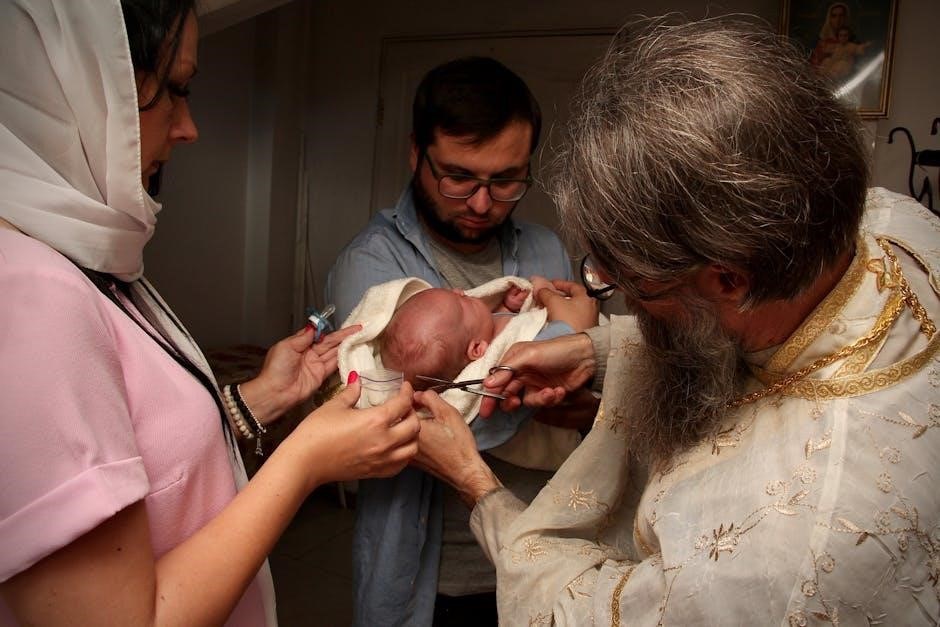
Historical Background of Eucharistic Adoration
Eucharistic adoration traces its roots to early Christian practices‚ emphasizing the real presence of Christ in the Blessed Sacrament. This devotion has historically fostered profound reverence and worship.
Development of Eucharistic Prayer Traditions
Eucharistic prayer traditions have evolved over centuries‚ drawing from early Church practices and scriptural roots. The development of these prayers reflects a deepening understanding of Christ’s presence in the Eucharist. Liturgical hymns‚ silent reflections‚ and litanies became integral parts of adoration‚ fostering a spiritual connection. The Church has refined these traditions‚ emphasizing their role in nurturing faith and unity. Prayers before the Blessed Sacrament‚ such as the Litany of Reparation and benediction rites‚ highlight the sacred nature of the Eucharist. These traditions continue to inspire devotion‚ blending ancient practices with contemporary expressions of worship‚ ensuring their relevance in modern spirituality.
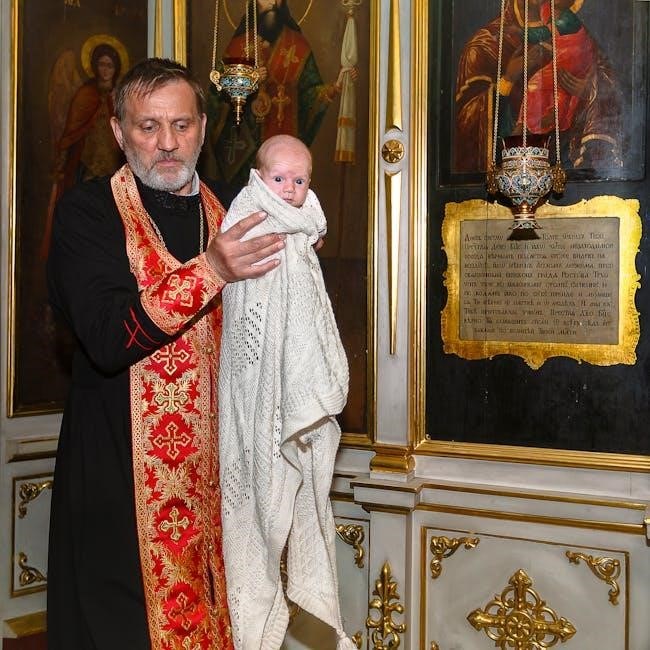
Types of Prayers Before the Blessed Sacrament
Prayers before the Blessed Sacrament include liturgical hymns‚ silent reflections‚ and personal devotions. Litanies‚ benediction rites‚ and communal worship also enrich this spiritual practice‚ fostering a deeper connection with Christ.
Liturgical Prayers and Personal Devotions
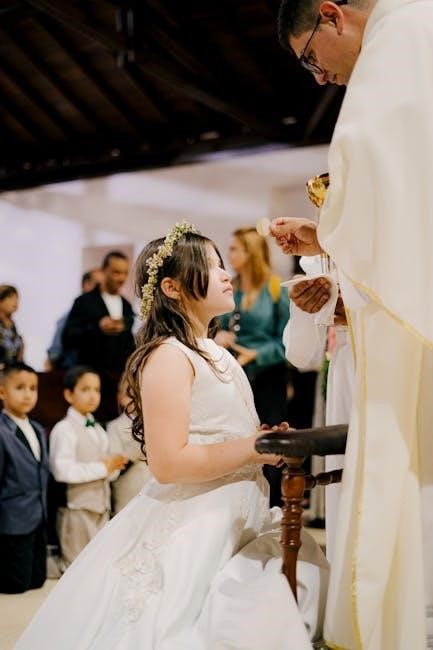
Liturgical prayers before the Blessed Sacrament‚ such as the Eucharistic Prayer II from the Roman Missal‚ are formal expressions of worship‚ often recited during Mass or communal adoration. These prayers emphasize the sacrificial nature of the Eucharist and the unity of the faithful. In contrast‚ personal devotions are more intimate and individualized‚ allowing believers to express their unique relationship with Christ. Devotions may include silent reflection‚ rosary recitation‚ or spontaneous prayer‚ fostering a personal encounter with the divine. Both forms complement each other‚ providing a balance between communal and individual worship. The availability of PDF prayer books offers structured guidance‚ while personal devotions encourage heartfelt expressions of faith. This blend enriches the spiritual experience‚ deepening one’s connection to the Eucharist and fostering a life of prayer and devotion.
Prayers for Eucharistic Adoration
Eucharistic Adoration involves opening songs‚ litanies‚ and silent reflection‚ fostering intimacy with Christ. Benediction concludes the devotion‚ emphasizing worship and gratitude. PDF prayer books provide structured guidance for these sacred moments.
Opening Songs‚ Litanies‚ and Silent Reflection
The opening songs and litanies in Eucharistic Adoration set a reverent tone‚ inviting worshipers to focus on Christ’s presence. These hymns and prayers‚ often found in PDF prayer books‚ express devotion and prepare hearts for deeper communion. Silent reflection allows individuals to encounter God personally‚ fostering introspection and gratitude. This sacred time strengthens faith‚ encouraging believers to revere the Blessed Sacrament and seek spiritual renewal. The combination of music‚ litany‚ and silence creates a holistic experience‚ guiding worshipers to adore‚ thank‚ and ask for Christ’s blessings. These practices‚ rooted in tradition‚ remain essential in modern devotion‚ offering a meaningful way to connect with the Eucharistic Lord.
Benediction of the Blessed Sacrament
The Benediction of the Blessed Sacrament is a solemn ritual concluding Eucharistic Adoration‚ emphasizing reverence and devotion. It typically involves the presider incensing the Sacrament‚ symbolizing worship and purification. Prayers such as Tantum Ergo and O Salutaris Hostia are sung‚ expressing adoration and gratitude for Christ’s presence. The rite culminates with the priest blessing the congregation using the Blessed Sacrament‚ imparting spiritual grace. This sacred ceremony deepens the faithful’s connection to the Eucharist‚ fostering awe and spiritual renewal. Benediction serves as a powerful conclusion to adoration‚ reminding believers of the sacrament’s transformative power and their commitment to living a Eucharistic life.
The Role of the Holy Spirit in Eucharistic Prayer
The Holy Spirit strengthens faith and love‚ guiding believers in Eucharistic prayer. He reminds us of Christ’s sacrifice‚ fostering reconciliation and unity through divine love in the sacrament.
Strengthening Faith and Love Through Prayer
Prayers before the Blessed Sacrament are a powerful way to deepen one’s faith and nurture divine love. Through these devotions‚ believers experience a profound connection to Christ‚ fostering a spirit of reconciliation and unity. The Holy Spirit plays a vital role in this process‚ guiding individuals to reflect on Christ’s sacrifice and the gift of the Eucharist. Personal prayer‚ litanies‚ and silent reflection before the Blessed Sacrament help believers grow in humility and devotion. The Litany of Reparation and other Eucharistic prayers emphasize the importance of repairing sins committed against the Sacrament. These prayers also encourage believers to seek spiritual renewal and strengthen their bond with God. By engaging in such devotions‚ individuals can experience transformative grace‚ deepening their faith and love for Christ in the Eucharist;

Prayers Before the Blessed Sacrament in Community
Community worship before the Blessed Sacrament fosters unity and shared devotion. Prayer stations and group reflections create a collective experience‚ strengthening faith and fostering a sense of togetherness.
Prayer Stations and Communal Worship
Prayer stations and communal worship are vibrant expressions of faith‚ fostering spiritual growth and unity. These stations‚ often set up during Eucharistic adoration‚ provide focused spaces for personal reflection and group prayer. Each station may highlight specific themes‚ such as gratitude‚ repentance‚ or intercession‚ guiding participants in their devotion. Communal worship strengthens bonds among believers‚ creating a shared experience of prayer and adoration. Through hymns‚ litanies‚ and silent reflection‚ the community honors Christ’s presence in the Blessed Sacrament. Such practices not only deepen individual faith but also cultivate a sense of belonging and collective purpose. Prayer stations and communal worship are powerful ways to engage with the Eucharist‚ drawing inspiration from its transformative power.
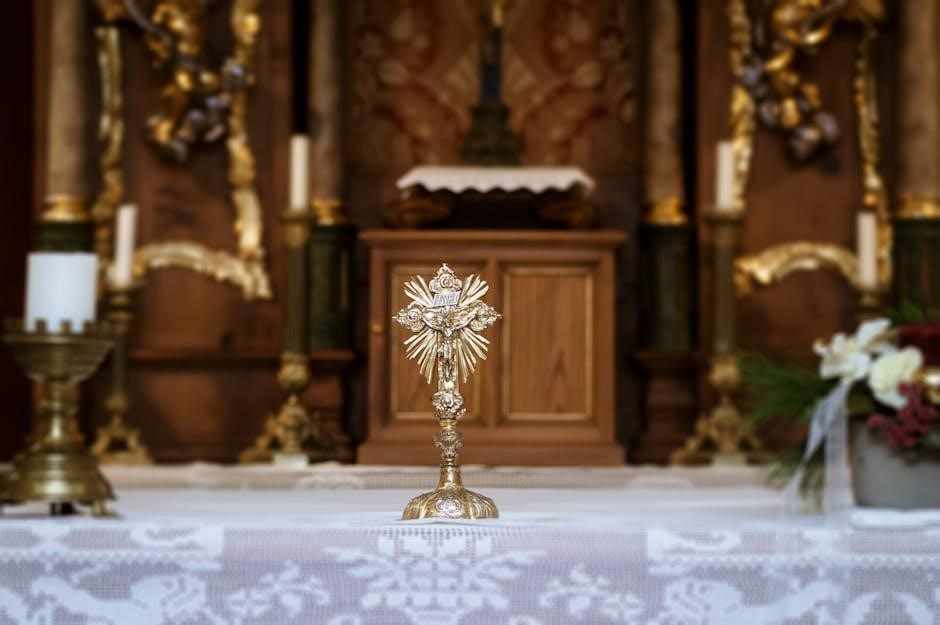
Closing Prayers and Reflections
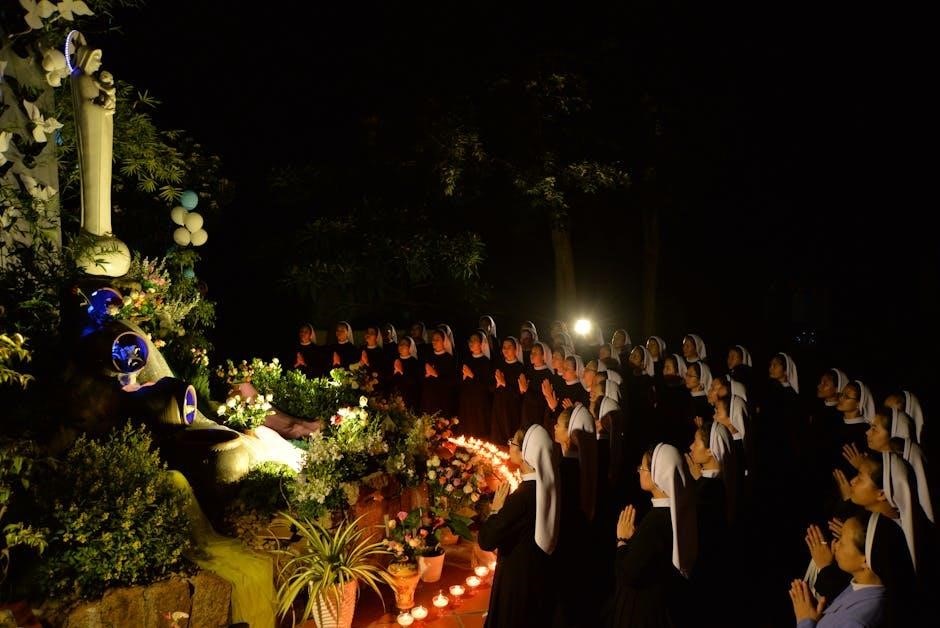
Closing prayers and reflections mark the end of Eucharistic adoration‚ offering thanks for grace received and seeking blessings. They emphasize gratitude and commitment to Christ’s presence.
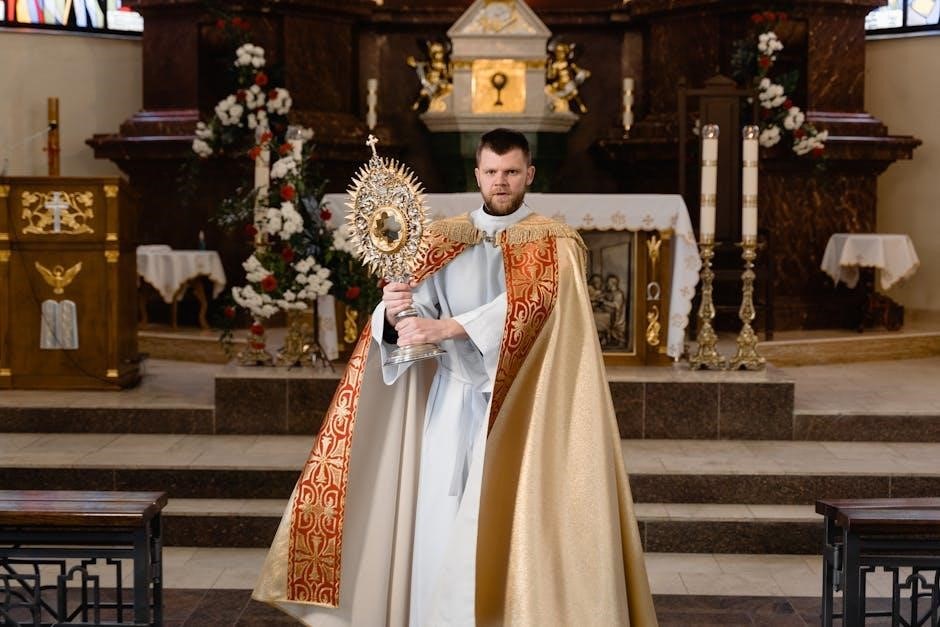
Concluding the Time of Adoration
Concluding the time of adoration involves final prayers and reflections‚ expressing gratitude for the encounter with Christ. Benediction‚ a solemn blessing‚ often concludes this sacred time‚ reinforcing devotion and faith. Many resources‚ such as PDF prayer books‚ provide structured closing rituals‚ ensuring a meaningful end to adoration. These prayers seek divine blessings and renewed commitment to living in Christ’s presence. The closing serves as a transition‚ carrying the spiritual renewal into daily life‚ while expressing hope for continued guidance and strength from the Eucharist.